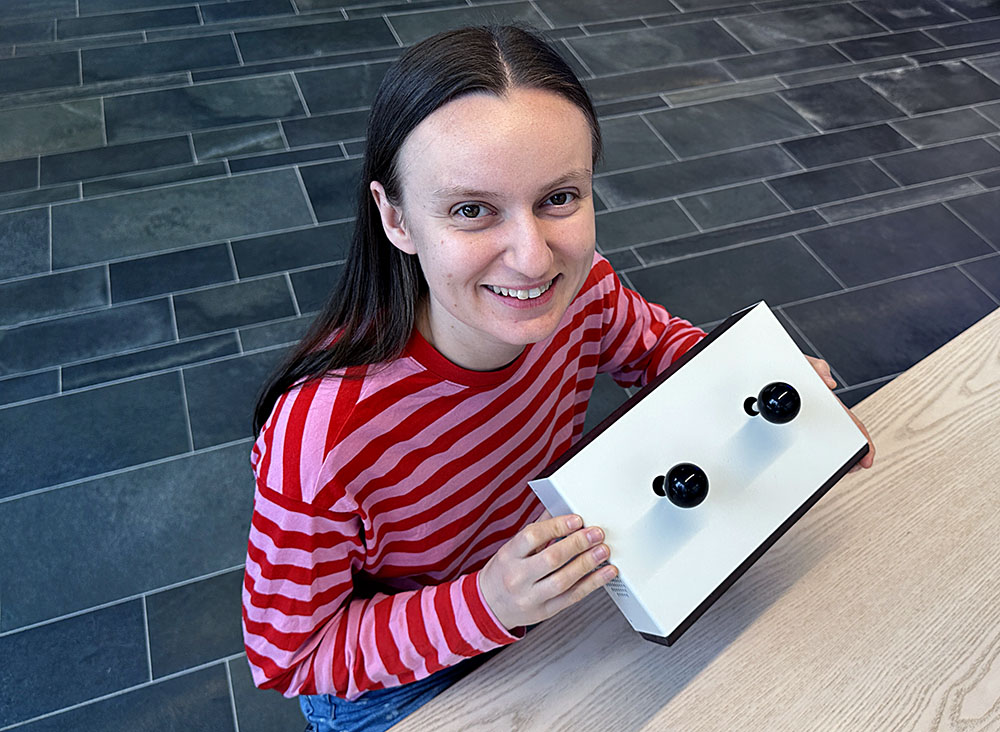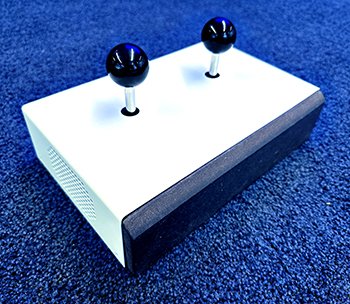From student assistant to instrument maker

Maria Svahn entered KTH with a background as a student assistant - She leaves the university with a technical innovation that she and fellow student Josefine Hölling created together. The importance of tackling things without worrying too much is one of the many lessons the duo will take with them in life.
Funki is the company founded by Svahn and Hölling who invented an inclusive musical instrument of the same name, an instrument made for people to play together regardless of cognitive ability.
"Actually, it is a set of instruments. Right now four variants that all look the same, but with different ways of interacting with them. The point of the instruments is that they sound good together no matter how you play them," Svahn says.
Keep the same pace and tone
These are the words of Svahn, a student in the master’s programme in Media Technology at KTH Royal Institute of Technology, specializing in human-computer interaction and audio and music programming. Soon it would turn out that the work experience gained before her studies would come in handy.
"Funki is primarily aimed at people with intellectual and other cognitive disabilities, or others who lack the skills needed to learn traditional instruments. Funki allows the user to play together with others, keeping the same rhythm and tone, and it was when I was working as an assistant that I realised the need," Svahn says.
Often sits with maracas
Svahn says there is very little innovation for this target group. Communication problems are common among the group. In school, communication between teachers and students often works reasonably well, but it is more difficult for students to communicate with each other. Playing together with Funki can be a great way to create a sense of togetherness among the students. There is also a need for a new approach.

"At school, students often sit with their maracas. They have been doing that for many decades now. We need more ways to create inclusion. And I mean fun ways. The Funki can also be played with any other instrument, such as the piano. People with or without disabilities can do things together. Everyone can participate fully. This is long-term and sustainable inclusion," Svahn says.
A meaningful, developing activity with a joyful exchange between musicians. This is what the company Funki is aiming for.
Svahn says in the future their instruments could also be used by others. For example, people with dementia, or other cognitive disabilities.
Funki is KTH all the way
Funki is a KTH product through and through. Svahn and Hölling started working on the instrument in a course on universal design, a course that was then run in collaboration with an adapted primary school in Stockholm. It immediately turned out to be the same school where Svahn had previously been a student assistant. The duo then continued to work on the instrument and managed to get an article published at a scientific conference in Shanghai. Finally, the KTH students get in touch with Donnie SC Lygonis, business coach at KTH Innovation, who helps them.
"Funki is KTH all the way. KTH Innovation has been incredible, and helped us so much. We also had a great KTH professor on the design course. His name is Kjetil Falkenberg, and he is fantastic. Without him, Funki would never have happened," Svahn says.
According to Svahn, Kjetil Falkenberg was the person who taught the duo to take action. If there was something that needed to be done, they just had to do it. To believe in yourself, not to see a lot of problems all the time.
Which brings the conversation to how Svahn and Hölling financed Funki.
"We have competed for all the money that the development has cost, through various startup competitions. I'm actually a bit proud of that," Svahn says.
Text: Peter Asplund
